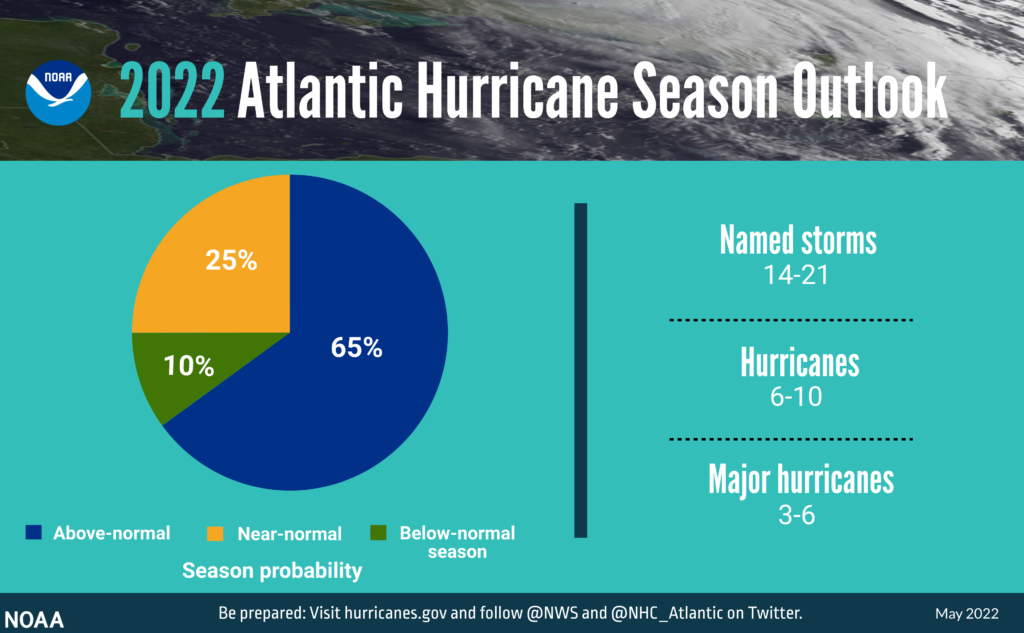WASHINGTON, D.C. - Forecasters at NOAA's Climate Prediction Center, a division of the National Weather Service, are predicting above average hurricane activity this year, which would make it the seventh consecutive above average hurricane season.
NOAA's outlook for the 2022 Atlantic hurricane season, which extends from June 1 to Nov. 30, predicts a 65% chance of an above normal season, a 25% chance of a near normal season and a 10% chance of a below normal season.
For the 2022 hurricane season, NOAA is forecasting a likely range of 14 to 21 named storms, with winds exceeding 39 miles-per-hour, of which six to 10 could become hurricanes, with winds above 74 miles-per-hour, including 3-6 major hurricanes (Category 3, 4 or 5), with winds of 111 miles-per-hour or higher. NOAA provides these ranges with a 70% confidence.
 The increased activity anticipated this hurricane season is attributed to several climate factors, including the ongoing La Niña that is likely to persist throughout the hurricane season, warmer than average sea surface temperatures in the Atlantic Ocean and Caribbean Sea, weaker tropical Atlantic trade winds and an enhanced West African monsoon. An enhanced West African monsoon supports stronger African easterly waves, which seed many of the strongest and longest-lived hurricanes during most seasons. The way in which climate change impacts the strength and frequency of tropical cyclones is a continuous area of study for NOAA scientists.
The increased activity anticipated this hurricane season is attributed to several climate factors, including the ongoing La Niña that is likely to persist throughout the hurricane season, warmer than average sea surface temperatures in the Atlantic Ocean and Caribbean Sea, weaker tropical Atlantic trade winds and an enhanced West African monsoon. An enhanced West African monsoon supports stronger African easterly waves, which seed many of the strongest and longest-lived hurricanes during most seasons. The way in which climate change impacts the strength and frequency of tropical cyclones is a continuous area of study for NOAA scientists.
As we reflect on another potentially busy hurricane season, past storms such as Superstorm Sandy which devastated the New York metro area 10 years ago remind us that the impact of one storm can be felt for years, NOAA Administrator Rick Spinrad, Ph.D. said in a release. Since Sandy, NOAA's forecasting accuracy has continued to improve, allowing us to better predict the impacts of major hurricanes to lives and livelihoods.
Residents of the Downbeach area are urged to be prepared to take action and heed the advice of local emergency management teams, including evacuation orders in the event of a major storm.
It's important for everyone to understand their risk and take proactive steps to get ready now by visiting Ready.gov and Listo.gov for preparedness tips, and by downloading the FEMA app to make sure you are receiving emergency alerts in real-time. EMA Administrator Deanne Criswell said.
To register for local emergency alerts see, ventnorcity.org, margate-nj.com or longportnj.gov.